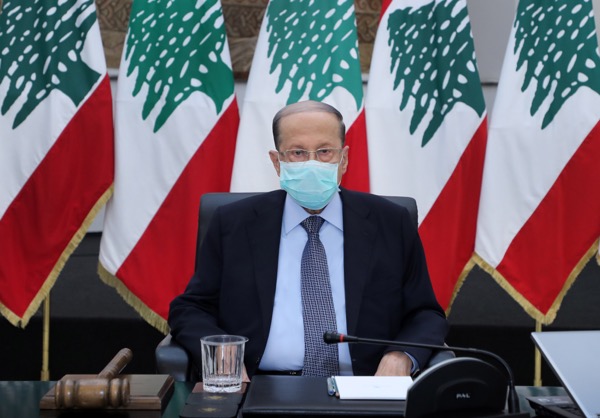
on Monday April 6, 2020
Lebanon’s foreign-exchange crisis is intensifying, prompting another appeal by the government for financial aid after its debt default last month.
Local banks have reduced the amount of dollars customers can withdraw from their accounts and even forced them to accept conversions into the local currency in some instances. Two of the largest have almost stopped dispensing foreign exchange entirely, while the central bank has greatly cut its supply, said senior bankers, who didn’t want to be named.
The shortages of hard currency have already led to a deep recession and crippled many businesses as they struggle to import essential goods. The coronavirus pandemic and a nationwide lockdown to stop its spread are adding to the problems, with Lebanese lenders having closed most of their branches.
The country has suffered net capital outflows every month since July, according to government data, as the large diaspora that used to prop up the banking system stops sending remittances. Some lenders’ correspondent banks are cutting back on services as dollars run dry, according to the bankers.
The central bank didn’t respond to a request for comment.
Lebanon’s default on $31 billion of Eurobonds removed one of the last remaining sources of foreign exchange for local banks. Many of them relied on the interest and principal from those to service their clients’ dollar demands.
The government has yet to begin formal restructuring talks with creditors. It decided against repaying a $1.2 billion bond last month to save what’s left of its reserves for imports such as food, medicine and fuel.
Lebanon’s president and prime minister said on Monday external financing was vital for economic reforms.
“Our reform program needs external financial aid, especially from the friendly countries and from the International Support Group to help our balance of payments and develop our vital sectors,” President Michel Aoun said. The ISG is a United Nations-led grouping that includes the U.S. and France.
Pound Unpegged
The Lebanese pound has plunged almost 25% on the black market this year to 2,800 per dollar, according to lebaneselira.org, a local website. It’s now 46% weaker than the official rate of 1,507.5, which has been pegged for decades.
That’s causing inflation to accelerate and it could reach 25% this year, the government said in a presentation last month. The economy may contract by 12% from 2019, it said.
While the central bank hasn’t said whether the peg will be formally removed, it instructed lenders last week to pay depositors with up to$3,000 in pounds at a so-called market rate, rather than the official one. The Association of Banks in Lebanon will decide on the market rate Monday.
Lebanese politicians have long said the peg helps guarantee social stability by allowing the country to import food and other goods cheaply. Anti-government protesters took to the streets en masse in October, partly because of falling living standards and rising prices. They forced the resignation of then-Prime Minister Saad Hariri.
“An official devaluation looks increasingly likely,” said Carla Slim, a Standard Chartered economist for the Middle East, North Africa and Turkey. “Restructured debt would be assessed in the context of the new” exchange rate, she said.
Positive Move
The new rule for small dollar deposits is positive as it will reduce banks’ foreign-currency liabilities, according to Morgan Stanley.
“Measures on de-dollarisation on small deposits at the market rate, as opposed to the official rate, indicate that the authorities will embrace a weaker FX rate,” said Jaiparan Khurana, a Morgan Stanley strategist in London. “If larger deposits are also de-dollarised, but at around the official rate, significant fiscal savings can be achieved.”
The government has asked the International Monetary Fund for technical advice. But most senior politicians are against a loan from the Washington-based lender, given that Lebanon would probably be required to raise taxes and cut subsidies.
Without some form of external funding, the ability of Lebanese banks to meet their foreign-currency obligations “is in serious doubt,” according to Fitch Ratings.
2,600 pounds rate
Lebanese banks will apply an exchange rate of 2,600 pounds per dollar for withdrawals from accounts of up to 5 million Lebanese pounds, a central bank source said on Monday, in the first implementation of new central bank circular.
Lebanon is still applying an official peg of 1,507.5 pounds to the dollar for bank transactions and critical imports.
But the circular issued on Friday said deposits of $3,000 or less could be withdrawn in Lebanese pounds at a “market” rate, allowing small depositors to cash out despite tight banking controls.
BLOOMBERG

Leave a Reply
You must be logged in to post a comment.